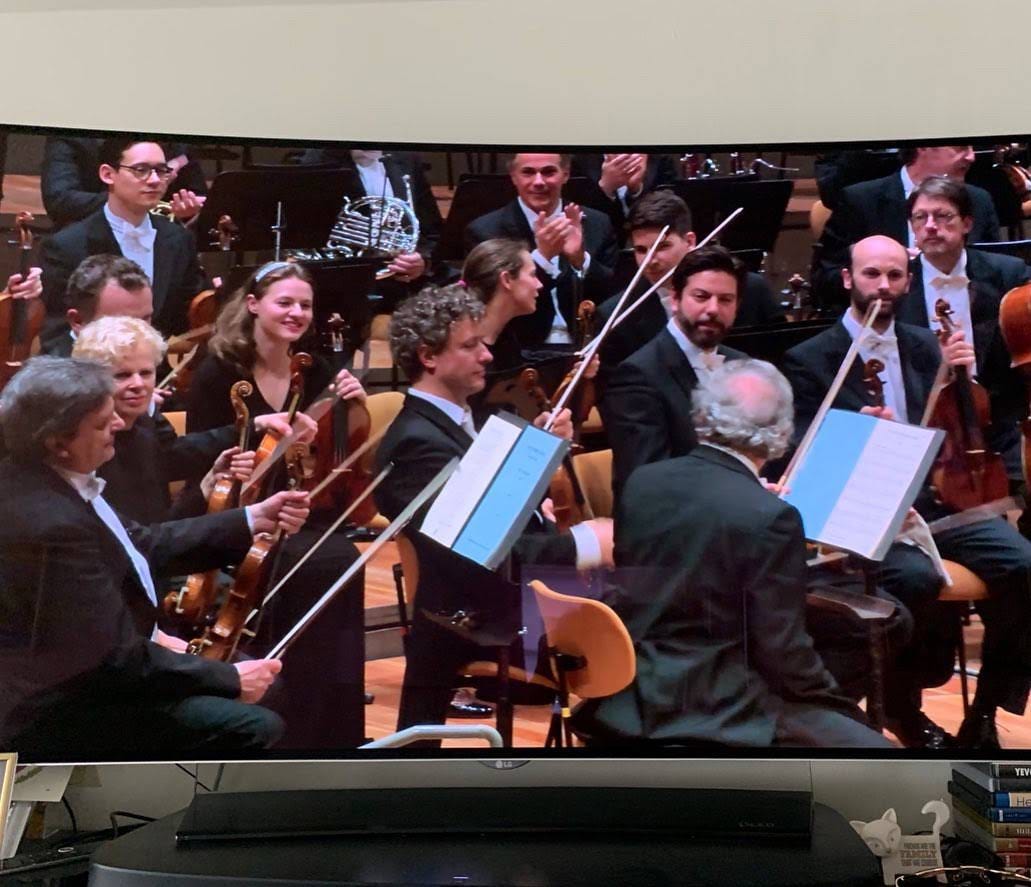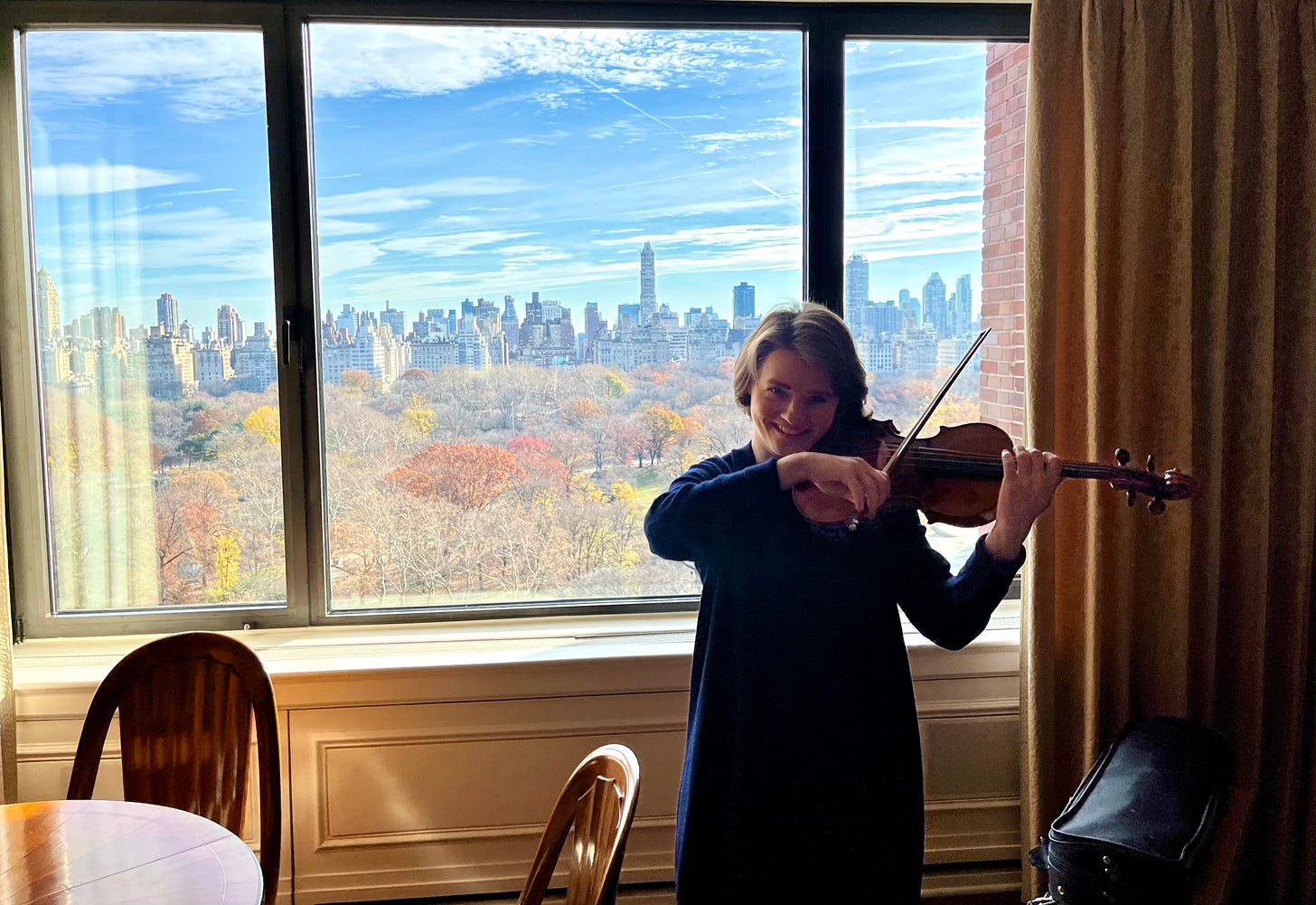The violin and I have had such an intense and long relationship that I almost cannot separate myself from this being. I have probably dedicated more energy, passion, and time to this gorgeous wooden box with an angelic voice than to any human being. From a young age, I felt that the violin was the most appropriate partner to tell my innermost thoughts and feelings. I enjoyed playing soulful and melancholic music in which I poured out my heartbreak over family quarrels and other childhood annoyances. My school days were not fun, not only because my inability to get out of bed in the morning drove my whole family mad, but my chubbiness and violin nerdiness made me a sort of outcast in my class. I did not care too much, however, because deep down inside, I knew that I had something that gave me comfort and strength. And it was a violin in my hand. I realized early on that I could speak through it unabashedly, and the more I tried to say what I felt, the deeper it sang. So, I never wished away any of my hardships because I knew that I could channel all my emotions to create rich music. It also enabled me to be heard and appreciated by audiences. I gained many friends who listened to me, even though they were mostly not my peers.

As I got older, my relationship with the violin began to change. I didn't like the pressure of winning competitions and auditioning for the most prestigious music schools. I hated the bad feelings associated with competing against my violinist friends. Additionally, I was subjected to frequent failures due to the nature of this art form. Everyone has different opinions and preferences, plus the results of competitions are often skewed due to jury biases. As the pressure increased, my body began to react negatively. I developed tension problems and experienced neck and shoulder pain. I fought my injuries while feeling pressured to practice a lot and outperform my peers. My pains often made me consider a career pivot. At 18, I dreamed of becoming a film actress rather than a violinist. I tried to convince my family to let me make the change, but they were skeptical. They thought that I should only quit if I were to pursue a "real" profession. We managed to find a compromise that I would be allowed to apply at the Theatre Academy in Warsaw if I did not get accepted at the Curtis Institute of Music in Philadelphia. As it happened, I was admitted, and so our deal fell through.
At the Curtis Institute, I was primarily focused on winning the approval of my professors and receiving their support. Unfortunately, I never managed to become a favorite student of any of my professors, which caused me grief, especially since I could not decipher the root cause. I kept wondering whether it was my playing or personality that did not attract their attention. Nevertheless, I knew that one day I would have to learn to stand on my own feet and I might as well start early. Luckily, I had received a lot of praise, many incredible opportunities, and accolades earlier in life, which still provided some boost of confidence in the trying times. In other times, the early success had a countereffect because, as a result, I felt that people had higher expectations of me than I could fulfill. The dream of becoming the greatest violin soloist began to recede. There is only a handful of places in the world for the lucky ones who can carry that title, and there seemed to be better candidates for the role than me. I think all in all, it was a pretty good idea to aim for the highest possible target because when I lowered my expectations, I still aimed very high: the Berliner Philharmoniker.
I was lucky enough to win a spot in the Berliner Philharmoniker’s prestigious Karajan Academy. While in Berlin, I auditioned for a full-time position with this top orchestra and was one of the two considered candidates. My violin playing and artistry were appreciated and respected, so I could no longer feel like a failure. My self-confidence was mostly under control, though I had moments of utter doubt and uncertainty. I would use my favorite Kundalini yoga mantras in those moments before going on stage. I would also think of the phrase "fake it till you make it,” though, after 20 years of intense practice and training at the highest level, I was probably prepared well enough to believe that I am able to play the violin.
After starting an ambitious transition to another field last year, I was curious to see if and how my relationship with the violin would change. At first, I didn't feel anything. I had no desire to play the violin, so I didn't touch it for months. Then, when asked to play somewhere, I would spend days warming up my stiff fingers and building up calluses so I could press against the thin metal strings to make a beautiful, rich sound. After the initial pain, my skills would quickly return. For the first 12 months, I kept telling myself that I wasn't playing as well as previously. It probably wasn't just the rusty skill set but also the guilt of betraying my calling, my identity, what most people thought was my true love. How could I play as well or better if I set my mind to new ideas?
Now, a year after my initial hiatus, I feel that I have finally freed myself from the negativity of doing something seriously, professionally. I'm also no longer just a violinist. I'm much more whole, much more of who I am deep down inside, open to wide-ranging interests and possibilities, and I bring that to my music. My violin playing has become freer, even wilder at times, and above all, more enjoyable, especially for myself. Nowadays, I sometimes play for hours on end, without correcting mistakes or criticizing myself, just having fun with my violin. I also love playing on stage. I don't have any expectations that I need to live up to. I have no auditions or competitions to win or teachers to please. I am now as free to make mistakes as I am to make the most passionate, authentic music. I dare to go all the way. I also feel less tension in my body when I play. I used to blame the violin for my pain issues, but now I wonder if another cause was perhaps the stress and pressure of my environment.
I really love the violin because my ability to play this incredibly demanding instrument is one of the few things that cannot be taken away from me. And I probably won't devote the next two decades of my life to anything else to the same degree - anything that requires at least six months of deliberate practice to produce the merest effect of a decent-sounding single note. I am very proud of the fact that I have persevered along this long road of many highs and lows, with my patience being tried more times than can be counted. However, had I not stuck to playing the violin for over two decades, I would not have been able to experience the deep connection with it that I do today. I am grateful for music and my violin. My life is much richer because of them. I am sure I would perceive the world very differently had I not experienced the unique life path of being a humble servant of this beautiful art form.




